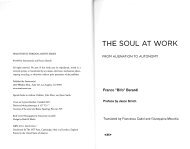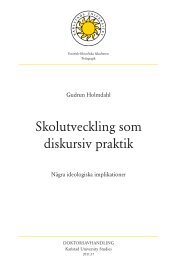FULLTEXT01
FULLTEXT01
FULLTEXT01
Create successful ePaper yourself
Turn your PDF publications into a flip-book with our unique Google optimized e-Paper software.
depending on time and context will be seen as controversial, while others will<br />
be taken for granted. This means that there also exists an inseparable<br />
relationship between the way of arguing, and what can be perceived as<br />
ideological implications (Billig, 2005, 2009: Billig, Condor, Edwards, Gane,<br />
Middleton, & Radley, 1988). The analytical tools used in the study are<br />
interpretative repertoires and ideological dilemmas.<br />
The analytical concepts of interpretative repertoires and ideological dilemmas<br />
partially intertwine, because both can be understood as descriptions of<br />
rhetorical resources and discursive strategies, which are more or less available at<br />
a particular historical moment. To that extent, the concept of interpretative<br />
repertoires represents some of the material in the „common sense‟, of which a<br />
discursive practice is constituted. The concept of ideological dilemmas implies<br />
that the method of combining different interpretative repertoires around the<br />
same social phenomenon, i.e. the design of the argumentation, can be regarded<br />
as a rhetorical construction, conditional on the specific common sense of one<br />
discursive practice (Edley, 2001). That means that also particular ways of saying<br />
or writing something at a certain moment will seem more natural than other<br />
ways.<br />
The analysis aims to detect and to identify the interpretative repertoires that are<br />
used, the ideological dilemmas that are present, as well as determine how they<br />
are separated from one another, as well as how they intertwine (Edley, 2001).<br />
One should as a part of analysis also note what is not being challenged or<br />
questioned, or understood as obvious and normalized, while this is also<br />
considered to be a part of the discursive practice. Also paradoxes, tensions and<br />
significant shifts in the arguments and what can thereby gain credibility, should<br />
be considered in the analysis, which is to include ideological implications of the<br />
discursive practice in the analysis. Empirical studies have namely shown that<br />
such discrimination may well be achieved by an argument which not „purports<br />
to be‟ discriminatory (Billig, 2005; Wetherell & Potter, 1992). Although, I do<br />
not pay attention to „subject positions‟ very explicitly in the study, this must be<br />
regarded as an inevitable aspect of both interpretation repertoires and<br />
ideological dilemmas, because subject positions are seen as a part of every<br />
discursive structure.<br />
Within a broad sense postmodernly-oriented discourse analytic field, where I<br />
believe my study can be placed, truth and reality are considered as something<br />
relative and something dependent on a currently existing discourse (Wetherell,<br />
2005). Therefore a relativistic approach may also have implications on the<br />
173






